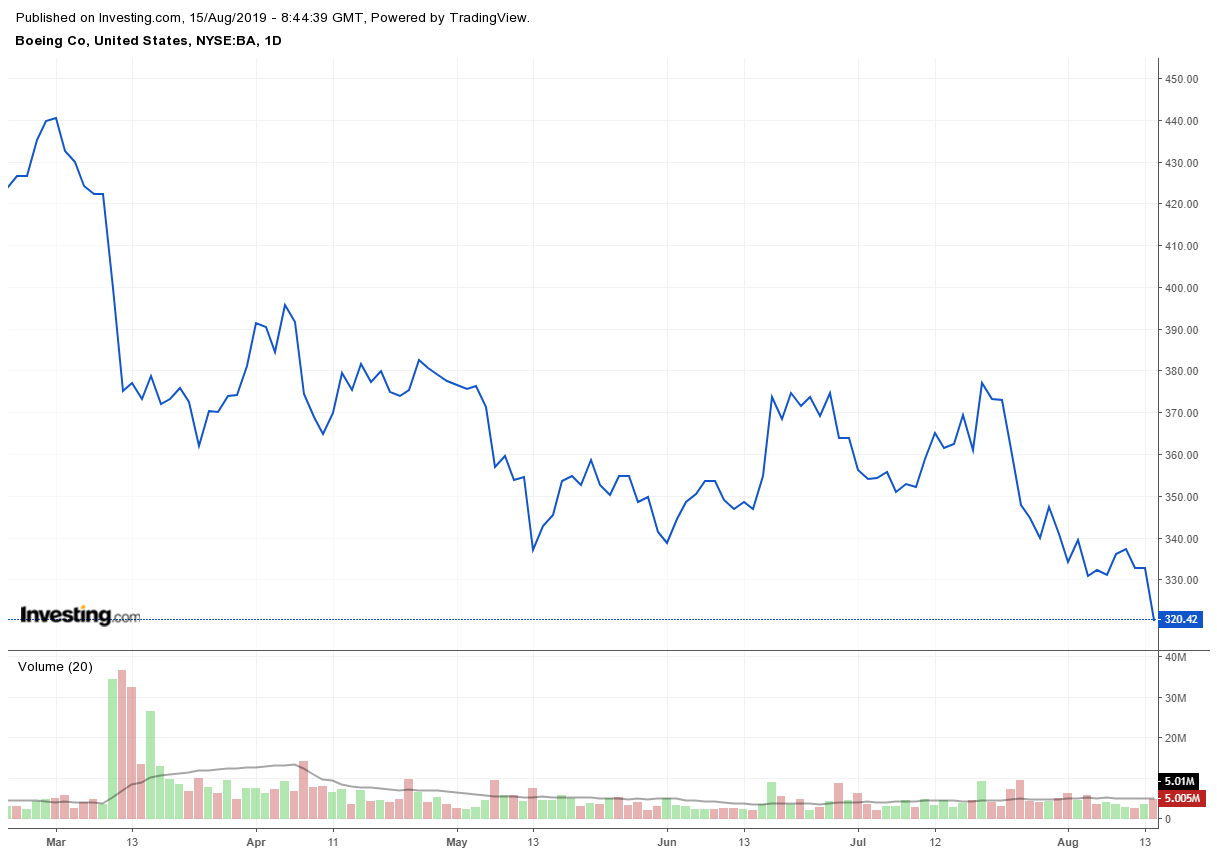Five months after the Ethiopian Airlines, Boeing 737 MAX jet crash, the second fatal incident for the company's new and popular airplane model in just five months, Boeing (NYSE:BA) continues to struggle with the massive fallout from the two incidents.
Earlier this week, news broke that the aerospace and defense giant had delivered fewer planes in July than in any other month this decade, putting the troubled airplane manufacturer once again in the spotlight. Unfortunately July's poor showing isn’t an isolated problem.
The company delivered 258 planes this year, almost 40% fewer than the 417 MAX jets it delivered during the same period in 2018. July was also the fifth straight month that the corporation received no new orders for the plane.

In addition, it's been five and a half months since shares of Boeing peaked, at $446. Since then, the stock is down 26%, currently trading at $330.53 as of Friday's close.
After the second crash, we were of the opinion that Boeing’s long term outlook was still positive and we still maintain that stance. To begin with, this isn't the first time Boeing has experienced crashes or safety issues. Previously it has always managed to improve its airplanes and bounce back from the negative publicity.
Second, the company enjoys a muscular duopoly with Airbus (PA:AIR), the French airplane manufacturer. Third, Boeing still receives tax subsidies from the U.S. federal government, which continues to view the company as providing a strategic military advantage.
As well, the air travel industry is expected to double through 2037. And finally—and perhaps most persuasive of all—Boeing has an orders backlog of $390 billion for its array of models. All of which continues to make Boeing a highly attractive bet long-term.
So what's pressuring its share price, and is there a good time to initiate a position?
The most important driver of recovery will be the active return of the 737 MAX. Though Boeing initially expected a fix by April, that timeline was extended to June after regulators expressed concerns. Currently the earliest the jet might be approved to fly again is in early Q4. However, many suspect that's extremely optimistic.
The longer the 737 MAX is out of commission, the greater Boeing's potential financial liabilities will be. With roughly 400 737 MAX jets grounded worldwide, Boeing is already on the hook to compensate customers for the problems caused. Indeed it has allocated $5 billion toward appeasing the airlines.
Additional budgetary liabilities will come from increased storage costs since Boeing won't be delivering any new 737 MAXs until the problem is resolved.
All of which creates a muddy short-term outlook for Boeing. As a rule expanding inventory on the balance sheet for any company is a cause for worry when demand appears to be slowing. Still, Boeing currently has over 5,000 orders for the 737 MAX, so when the flight ban is lifted, all inventory will immediately become deliveries, once again showcasing Boeing’s still dominant position in the industry.
The fact that new orders have stalled makes a certain kind of sense. Airlines are smartly sitting all this out, awaiting the efficacy of the fixes before committing new capital. And just one company, Saudi budget airline flyadeal, actually canceled their order for 50 planes. We fully expect new orders to resume once the plane is again airborne.
Even the $5 billion in charges Boeing is taking isn't really a concern. For starters, the corporation isn’t likely to offer cash.
Rather, they'll probably provide discounts on future purchases. As well, Boeing generated $13 billion in cash-flow last year, has $10 billion worth of cash on hand and over $6 billion in unused credit.
While deliveries of the jet fell last quarter, the rest of Boeing's operation—other aircraft such as the 787 or 767, as well as military planes and servicing revenues—have been unaffected. Even if the 737 MAX remains grounded well into next year, Boeing's financial stability will protect the company enough to ride out this temporary turbulence.
So when is a good time to initiate a position in Boeing? Since we believe the stock is trading at a discount right now, but with lack of clarity regarding when its share price will rise, dollar cost averaging appears to be the right move. Making one bet with a lump sum investment exposes investors to significant downside, especially since the earliest projection for an end to the grounding of the 737 MAX is this coming October and Boeing's shares continue to fall.
By slowly and methodically purchasing small amounts of stock on a schedule, regardless of price—which is the key to a dollar cost averaging strategy—investors don't have to try and time the market...a fundamental impossibility anyway, at least without inside knowledge. This would limit downside exposure to Boeing while taking advantage of potentially lower prices before any eventual recovery.
Disclaimer: All opinions expressed are subject to change without notice. This commentary is the author's opinion and should not be considered investment advice.
